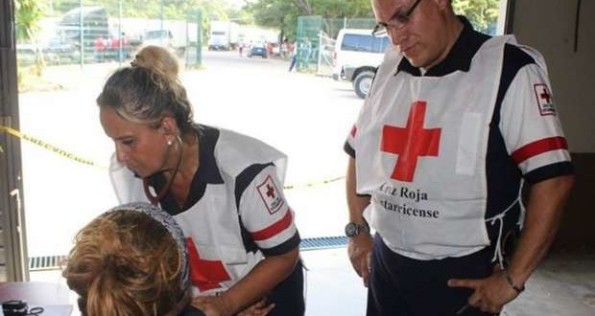 Iván García, Costa Rica, 29 November 2015 — In the last two weeks, the authorities in Costa Rica have been forced to open new shelters to care for the more than 3,000 Cubans trying to reach the U.S. who are stranded on the border with Nicaragua.
Iván García, Costa Rica, 29 November 2015 — In the last two weeks, the authorities in Costa Rica have been forced to open new shelters to care for the more than 3,000 Cubans trying to reach the U.S. who are stranded on the border with Nicaragua.
Since November 15, thousands of Cubans have been sleeping in temporary shelters because of the decision by Daniel Ortega’s government to deny passage to Cubans, after an outbreak of violence between the Cuban “land rafters” and riot forces from Nicaragua.
In spite of this measure, the number of Cubans arriving in Costa Rica through Panama continues to increase. In general they arrive at night, in groups of 50 or 100 people, in a village named Paso Canoas, more than 600 kilometers south of San José.
There they stay in hostels that charge between 5 and 50 dollars a night. Those who don’t have money, after being fleeced by coyotes and traffickers in Colombia, sleep on a boarding platform used by interprovincial buses.
The number of Cubans who have entered Costa Rica by Paso Canoas now exceeds 3,000, and it’s said that more than 300 would be waiting in Panama to cross the border. The shelters in the towns of La Cruz, Peñas Blancas and San Ramon are spilling over with emigrants from the Island.
Days earlier, Costa Rican authorities, in cooperation with the Catholic Church in San Ramon, an hour’s drive from San Jose, decided to open another shelter with the capacity of 280 people.
Cubans arriving by bus from Paso Canoas must pay 15 dollars for the ticket. But at least three dozen migrants find themselves sleeping on cardboard on the floor of the bus station. The uncertainty is the biggest worry for the Cubans.
After 2:30 in the afternoon, an Immigration official returned passports to the Cubans who wanted to go to one of the shelters, where the authorities are guaranteeing them three hot meals a day. While some wait in hostels or outdoors for a decision that is out of their hands, others, who now are counting their money in pennies, decided to stay in a shelter set up in the parish of La Pastoral, in the county of San Ramón.
During the six-hour journey, through steep hills and a mountainous landscape crowned by dormant volcanoes, many of the Cubans were snoozing, listening to music on their cell phones or talking with family members in Cuba using the Internet from the telephone lines they access locally.
Halfway there, the bus was stopped at a checkpoint. A Costa Rican policeman reviewed the passports and, in a respectful tone, warned the group not to try to enter Nicaragua illegally.
The other bus stop was at a business on the side of the road. This allowed the immigrants to stretch their legs and look at the merchandise that few could buy because of the high cost.
Around 10:00 at night, local time, the group of Cubans arrived at the hostel. There, some 30 volunteers from the church, the Red Cross and the priest, Gravin Hidalgo, were waiting to take care of them and offer them a dinner (soup, white rice, scrambled eggs, salad, bananas, bread and orange juice). Then they were shown to rooms with four individual beds in each.
According to Father Hidalgo, they “want famlies and groups of friends to stay together.” But the unstoppable influx of Cubans escaping the Castros’ “tropical socialism” worries the Costa Rican pastor.
“We already have more than 280 people here. We’ve had to set up bunk beds in a room to be able to take care of them.” The exquisite treatment and the detail of locating an image of the Virgen de la Caridad, the patron saint of Cuba, brought congratulations on the part of the emigrants.
“Some, moved, have commented to me that they made the crossing with necklaces of the Virgen de la Caridad as amulets. One of the Cubans gave me a stone chosen by him in the Santuario del Cobre, in Santiago de Cuba. A very valuable gift for me. We hope to take care of them the whole time they stay in San Ramón. The civil society of the city, the Church and the authorities are happy to give this help,” the priest pointed out.
But good will can flood humanitarian assistance in a small country, which doesn’t count on an army and has limited financial resources at its disposal.
Meanwhile, in Paso Canoas, Cubans continue arriving.
Iván García, from Costa Rica
Translated by Regina Anavy
